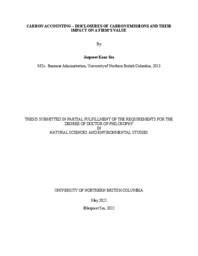Aben, Kyle
Person Preferred Name
Kyle Aben
Related Works
Content type
Digital Document
Description / Synopsis
Environmental sustainability is key to the long-term sustainability of a business during these times of climate change crises and global warming. Otherwise, survival will be challenging for large carbon emitters. This dissertation travels through carbon accounting to carbon reporting to corporate level environmental sustainability efforts and a firm’s value. It examines whether the corporation-level environmental sustainability efforts increase its value, focusing on Global 500 companies for 2010-2018. Measures used for corporate-level ecological sustainability include the choice of voluntary disclosure, carbon emission amounts, carbon intensity, and carbon disclosure quality. Different proxies used to measure a firm’s value comprise the market value of equity, return on assets, return on equity, Tobin’s Q, and enterprise value. During the study period, those corporations that chose to disclose their carbon-related data on the CDP’s public platform noticed that the market valued their environmental sustainability efforts by increasing their market value – showing the market value-relevant content of voluntary carbon disclosures. Carbon disclosure quality stands out among the proxies used to measure environmental sustainability efforts at a corporate level. Some interesting findings showed that measuring and disclosing Scope 3 emissions must have played a significant role in increasing a firm’s disclosure quality and so its market value. Similar to Assidi's research, this study provides guidelines for investors and managers to increase a firm’s value by using better quality carbon disclosures. This study also compared the firm’s value of disclosing and non-disclosing firms and, unfortunately, did not find any significant relationship between a company’s disclosure decision and market value in the context of global companies. These results are alarming given the current and potential hazards related to climate change and global warming. It seems that investors ignore climate-related urgency and focus on short-term profits. Companies do not find any incentives to reveal their environmental-related information on any public platform such as the CDP. This study examined and found that social pressure, market pressure, economic pressure, legal/institutional pressure, and previous year disclosure make the companies disclose their carbon information to the CDP. Based on the sample of the Global 500, the results support the notion that larger firms are aware of their social responsibility. So, they disclose environmental-related information voluntarily even in the absence of any mandatory requirement. Furthermore, high-levered firms are more likely to release their carbon-related information. However, the results report that a large proportion (25%) of the sample companies chose not to disclose carbon information. Also, this study showed that regulatory provisions had an observable influence on a company’s disclosing decision. These policies can force companies to reduce carbon emissions and make carbon disclosures their strategic priority. This study emphasized the impact of carbon disclosures, related information, their link to a firm’s value, and corporate-level environmental sustainability efforts. It also posits that corporation-level carbon disclosures can be a prerequisite to corporation-level ecological sustainability. In addition, these disclosures can serve as necessary and valuable environmental-related information for existing and potential investors and other interested stakeholders such as nongovernmental organizations (NGOs), governments, policymakers, accountants, sustainability experts, and researchers. On positive notes, around fifty-five percent of the corporations whom CDP approached for their environmental-related disclosures in 2010 reported to the CDP for the study period, to indicate that these firms are already in the war against climate change and working on business and environmental sustainability. Moreover, these efforts could pay off more in a mandatory environmental-related disclosure regime provided that these disclosures include all scope of emissions. Therefore, this study recommends that environmental-related disclosures be required as part of a company’s annual reports to be more informative for current and potential investors. Moreover, standards of environmental sustainability are needed from standard setters’ bodies to guide the companies to provide consistent and accurate information in their annual reports so that investors can make informed investment decisions.
Origin Information
Content type
Digital Document
Origin Information


